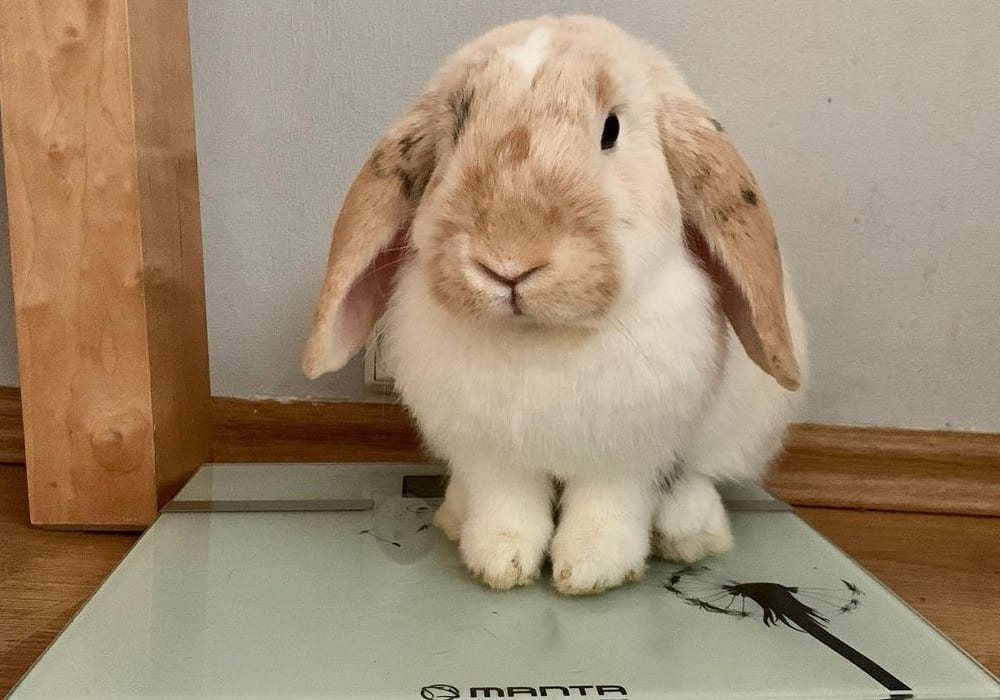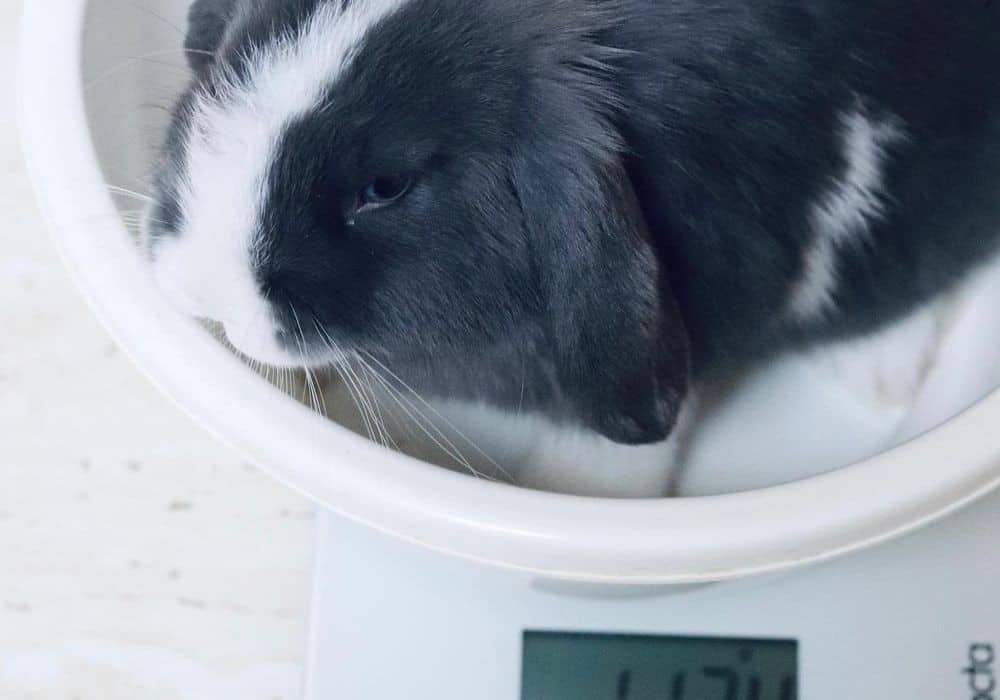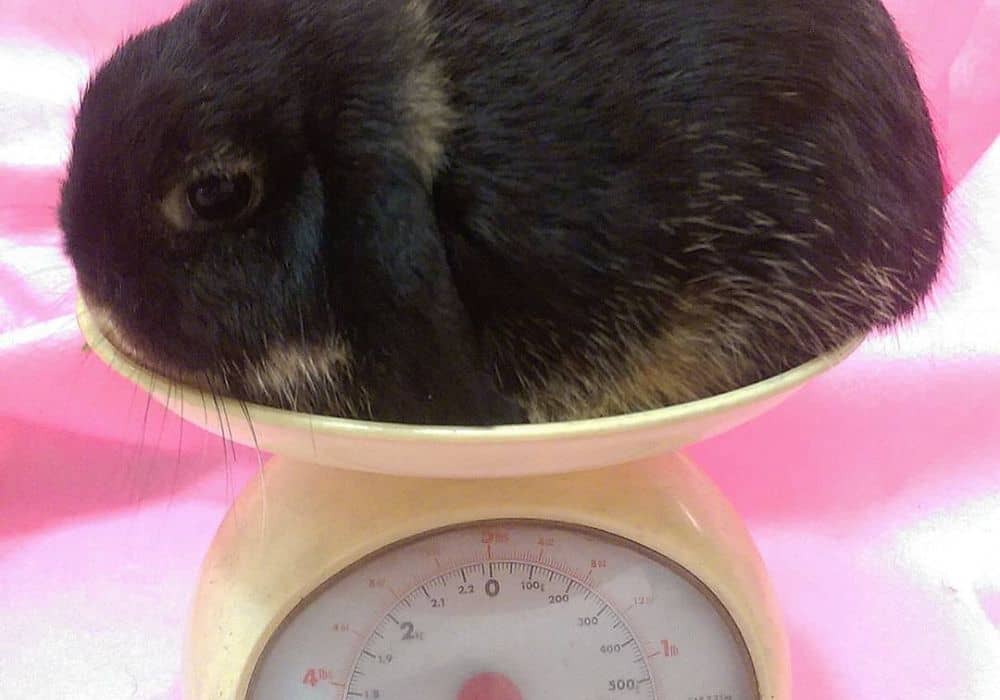Rabbits come in all shapes and sizes. Some rabbits are compact and short, while others are long and lanky. Some rabbits are heavy and some are light. There is no one “right” weight or length for a rabbit.
Rabbits, like all animals, come in a variety of sizes. The weight and length of a rabbit depend on the breed, as well as the individual animal.
If you are concerned about your rabbit’s weight or length, talk to your veterinarian. They can help you determine if your rabbit is the right weight for its size and if they are healthy.
In this article, you will learn how big can a rabbit get and what the normal weight of different rabbit breeds is.
Why You Need to Know the Weight of Rabbits
There are a few reasons why you might need to know the weight of your rabbit.
- If you are considering getting a pet rabbit, or already have one, it is important to know how much they weigh. This can help you determine if your rabbit is healthy, and also help you to understand how much food and water they need.
- If you are planning to take your rabbit to the vet, the weight can help the vet determine the proper dosage of medication.
- If your rabbit is sick or injured, knowing the weight can help you monitor its weight loss or gain.
- Additionally, if you are breeding rabbits, knowing the weight of the rabbits can help you determine if they are the right size for breeding.

What Affects the Weight of Rabbits
There are a few things that affect the weight of rabbits.
- The first is diet. A rabbit that eats a lot of high-calorie foods will weigh more than a rabbit that eats a low-calorie diet.
- The second thing that affects weight is exercise. A rabbit that is very active will burn more calories and will likely weigh less than a sedentary rabbit.
- Finally, genetics also play a role in weight. Some rabbits are simply born with a predisposition to be larger or smaller than others.
Breed
The largest breed of rabbit is the Flemish Giant. These rabbits can weigh up to 20 pounds. The smallest breed of rabbit is the Dutch Dwarf, which weighs about 2 pounds. Most breeds of rabbits fall somewhere in between.
So, how does the breed of rabbit affect its weight? The answer to that question depends on the breed. Some breeds of rabbits, like the Flemish Giant, are naturally larger and weigh more than other breeds. Other breeds, like the Dutch Dwarf, are naturally smaller and weigh less.
However, the breed of rabbit can also affect its weight in other ways. For example, some breeds of rabbits are more active than others. And, because they burn more calories, they tend to weigh less. Other breeds of rabbits, like the English Lop, are less active and weigh more.
So, the breed of rabbit can affect its weight in a number of ways. It all depends on the specific breed of rabbit and the individual rabbit’s characteristics.

Age
In general, rabbits tend to weigh less as they get older. This is because as rabbits age, their metabolisms slow down and they require less food to maintain their weight. Additionally, older rabbits are more likely to suffer from health problems that can cause them to lose weight. So, while there is no set rule, in general, you can expect an older rabbit to weigh less than a younger rabbit.
Height
The height of the rabbit affects its weight. The taller the rabbit, the heavier it will be. This is because a taller rabbit has a larger frame and more muscle. A shorter rabbit will be lighter because it has a smaller frame and less muscle.
How to Weigh Rabbits Correctly?
Weighing a rabbit can be a daunting task, but with a little practice, it can become second nature. The most important factor to consider when weighing a rabbit is to ensure that the animal is calm and comfortable. Here are a few tips to make the process as easy and stress-free as possible for both you and your furry friend.
The first step is to select the right equipment. A good set of scales that can measure in both pounds and kilograms is ideal. You will also need a small bowl or container to place the rabbit in, and a soft towel or blanket to keep them warm and secure.
Once you have your supplies ready, the next step is to get the rabbit comfortable on the scales. Some rabbits may be apprehensive at first, but with patience and gentle persuasion most will eventually calm down. If your rabbit is resistant to being weighed, try placing them in the bowl or container first. This will help to restrict their movement and make them less likely to jump off the scales.
Once the rabbit is calm, gently place them on the scales and take a reading. Note the weight down and then release the rabbit. If you need to weigh them again, repeat the process.
Weighing a rabbit can be an important part of their health care, so it is important to be as accurate as possible. With a little practice, you will be able to weigh your rabbit quickly and easily, and ensure that they are staying healthy and happy.
How Much Do Rabbits of Different Breeds Weigh
| Alaskan | 6 to 8.5 pounds |
| American | 9 to 12 pounds |
| American Sable | 7 to 10 pounds |
| English angora | 5 to 7 pounds, long silky hair |
| French angora | 7.5 to 10.5 pounds |
| Argente Rabbits | 5 to 12 pounds |
| Blanc de Hotot | 8 to 11 pounds |
| Britannia Petite | Less than 2.5 pounds |
| Californian | 8 to 12 pounds |
| Checkered Giant | More than 11 pounds |
| Cinnamon | 8.5 to 11 pounds |
| Chinchilla | 5.5 to 6.5 pounds |
| Continental | 12.4 pounds and up |
| Creme d'Argent | 8 to 11 pounds |
| Dutch | 3.5 to 5.5 pounds |
| Dward Hotot | Less than 3 pounds |
| English Lop | More than 9 pounds |
| English Spot | 5 to 8 pounds |
| Florida White | 4 to 6 pounds |
| French Lop | 10 pounds and over |
| Harlequin | 6.5 to 9.5 pounds |
| Havana | 4.5 to 6.5 pounds |
| Holland Lop | Less than 4 pounds |
| Mini Lop | 4.5 to 6.5 pounds |
| Mini Rex | 3 to 4.5 pounds |
| Netherland Dwarf | Less than 2.5 pounds |
| New Zealand | 9 to 12 pounds |
| Palomino | Less than 9.5 pounds |
| Polish | Less than 3.5 pounds |
| Satin | 8.5 to 11 pounds |
| Silver | 4 to 7 pounds |
Lionhead Rabbit Size Chart
There is no definitive Lionhead rabbit size chart, as the size of these rabbits can vary greatly depending on their breeding. However, Lionheads typically weigh between 2 and 4 pounds, with the males being somewhat larger than the females. Some Lionheads can grow as large as 8 pounds, but this is not the norm.

Causes of Weight Loss and Weight Gain in Rabbits
There are many reasons why rabbits may lose or gain weight. Diet, exercise, and genetics are all factors that can play a role in a rabbit’s weight.
If a rabbit is not eating enough, he may lose weight. This can be due to a poor diet, a medical problem, or stress.
If a rabbit is eating too much, he may gain weight. This can be due to a diet high in sugar or carbohydrates, or a lack of exercise.
Genetics can also play a role in a rabbit’s weight. Some rabbits are simply more prone to being overweight than others.
How to Maintain a Balanced Weight: Nutrition and Games
As a pet owner, it is important to be aware of your animal’s weight and health. An unhealthy weight can lead to many problems and potentially shorten their lifespan. Here are some tips on how to maintain a balanced weight for your rabbit:
- Make sure they are eating a healthy diet. A diet rich in fiber, hay, and fresh vegetables is important for keeping your rabbit healthy and at a good weight.
- Avoid giving them too many treats. While it’s okay to give your rabbit the occasional treat, too many can lead to weight gain.
- Provide them with plenty of exercises. A healthy weight for a rabbit is achieved through a combination of a good diet and exercise.
- Monitor their weight regularly. Keep an eye on your rabbit’s weight and body condition so you can catch any weight gain early on.
By following these tips, you can help ensure your rabbit stays at a healthy weight.

How Much Does a Rabbit Weigh In KG and Other Units of Measurement?
How much does a rabbit weigh? This is a question that is often asked by those who are considering getting a rabbit as a pet. The answer to this question can vary depending on the breed of rabbit and its age. For example, a newborn rabbit can weigh anywhere from 3/4 of a pound to 1 1/2 pounds. An adult rabbit can weigh anywhere from 4 pounds to 10 pounds.
There are a few different ways to measure the weight of a rabbit. The most common way is to use a scale that measures in pounds and ounces. However, you can also use a scale that measures in kilograms. To convert pounds to kilograms, you can use this formula: 1 kilogram = 2.2 pounds.
FAQ
How Much Does a Rabbit Consume per Body Weight?
A typical healthy adult rabbit will consume approximately 2% of its body weight in hay, fresh vegetables, and pellets every day.
How Much Does a 14 Day Old Rabbit Weight?
A 14-day old rabbit typically weighs between 1.1 and 1.8 pounds. This range is based on the average weight of a rabbit at various ages and is meant to be used as a general guideline. It is important to remember that each rabbit is unique and will weigh differently, even within the same litter.

How Much Weight Does a New Zealand Rabbit Gain?
A New Zealand rabbit typically gains about 1.5 to 2 pounds in weight. However, this can vary depending on the individual rabbit and its diet. Some rabbits may gain more weight than others, so it is important to keep an eye on your rabbit’s weight and make sure it is not gaining too much. If your rabbit is gaining too much weight, you may need to adjust its diet or increase its exercise.
How Big Does a Bunny Get?
There isn’t a definitive answer to this question since bunnies can grow to different sizes, but on average, a bunny will grow to be about 8-12 inches long and weigh around 2-4 pounds. Some bunnies may grow to be larger or smaller, depending on their diet and environment.
Conclusion
There is a lot of variation in the weight and length of rabbits.
Rabbits come in many different breeds, and each breed can have a different weight and size. For example, the Flemish Giant rabbit is one of the largest breeds. On the other hand, the Netherland Dwarf rabbit is one of the smallest breeds.
No matter what the breed, all rabbits should have a healthy weight and length. If you think your rabbit may be too skinny or too fat, talk to your veterinarian. They can help you determine if your rabbit is a healthy weight and give you tips on how to help them maintain a healthy weight.
References:
- Flemish Giant rabbit (Wikipedia): https://en.wikipedia.org/wiki/Flemish_Giant_rabbit
- Carbohydrates (Medline Plus): https://medlineplus.gov/carbohydrates.html
- Top 10 High-Fiber Foods (BENEFIBER): https://www.benefiber.com/fiber-in-your-life/daily-fiber-intake/top-10-high-fiber-foods/
Also read:
- Discover the Amazing World of 10 Day Old Bunnies: All About Rabbits!
- Discover All About the Characteristics of a 1 Year Old Rabbit
- Why Doesn’t My Rabbit Like Me? – Understanding Rabbit Behavior for All About Rabbits
- Everything You Need to Know About Bunny Grinding Teeth in Rabbits
- How Eating Poop is Part of a Normal Rabbit Diet – All About Rabbits
